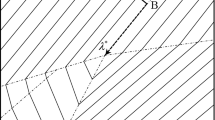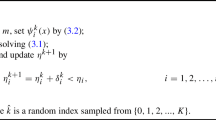Abstract
Mathematical programs with equilibrium constraints (MPEC) are special class of constrained optimization problems. The feasible set of MPEC violates most of the standard constraint qualifications. Thus, the Karush-Kuhn-Tucker conditions are not necessarily satisfied at minimizers, and the convergence assumptions of many methods for solving constrained optimization problems are not fulfilled. Thus, it is necessary, from a theoretical and numerical point of view, to consider suitable optimality conditions for solving such optimization problems. In this paper, we show that M-stationary condition is sufficient for global or local optimality under some mathematical programming problem with equilibrium constraints and generalized invexity assumptions. Further, we formulate and study, Wolfe-type and Mond-Weir-type dual models for the MPEC and we establish weak and strong duality theorems relating to the MPEC and the two dual models under invexity and generalized invexity assumptions. The main purpose of this manuscript is to study the Mathematical programs with equilibrium constraints under the framework of differentiable generalized invex functions and to obtain optimality conditions and duality results.
Similar content being viewed by others
Data Availability
This research article contains all the data generated and materials obtained during this study.
References
Stackelberg HV (1952) The Theory of Market Economy. Oxford University, Press, Oxford
Nash JF (1951) Non-cooperative Games. Anal Math 54:286–295
Bracken J, McGill JT (1978) Production and marketing decisions with multiple objectives in a competitive environment. J Optim Theory Appl 24(3):449–458
Pang JS, Trinkle JC (1996) Complementarity formulations and existence of solutions of dynamic multi-rigid-body contact problems with Coulomb friction. Math Prog 73(2):199–226
Falk JE, Liu J (1995) On bilevel programming, part I: general nonlinear cases. Math Program 70(1–3):47–72
Vicente LN, Calamai P (1994) Bilevel and multilevel programming: A bibliography review. J Global Optim 5(3):291–306
Fukushima M, Pang JS (1998) Some feasibility issues in mathematical programs with equilibrium constraints. SIAM J Optim 8(3):673–681
Scheel H, Scholtes S (2000) Mathematical programs with complementarity constraints: Stationarity, optimality, and sensitivity. Math Oper Res 25(1):1–22
Henrion R, Surowiec T (2011) On calmness conditions in convex bilevel programming. Appl Anal 90(6):951–970
Mordukhovich BS (2006) Variational analysis and generalized differentiation I: Basic Theory. Grundlehren der Mathematischen Wissenschaften [FundamentalPrinciples of Mathematical Sciences], vol 330. Springer-Verlag, Berlin, pp xxii+579
Gfrerer H (2014) Optimality conditions for disjunctive programs based on generalized differentiation with application to mathematical programs with equilibrium constraints. SIAM J. Optim. 24(2):898–931
Joshi BC, Mishra SK (2019) On nonsmooth mathematical programs with equilibrium constraints using generalized convexity. Yugosl J Oper Res 29(4):449–463
Joshi BC, Mishra SK, Pankaj (2019) On Semi-infinite Mathematical Programming Problems with Equilibrium Constraints Using Generalized Convexity. J Oper Res Soc China 8(4):619–636
Joshi BC (2020) Optimality and duality for nonsmooth semi-infinite mathematical program with equilibrium constraints involving generalized invexity of order \(\sigma > 0\). RAIRO Oper Res. https://doi.org/10.1051/ro/2020081
Raghunathan AU, Biegler LT (2003) Mathematical programs with equilibrium constraints (MPECs) in process engineering. Comput Chem Eng 27(10):1381–1392
Britz W, Ferris M, Kuhn A (2013) Modeling water allocating institutions based on multiple optimization problems with equilibrium constraints. Environ Model Softw 46:196–207
Anandalingam G, Friesz TL (eds) (1992) Hierarchical Optimization: An introduction. Ann Oper Res 34(1):1–11
Harker PT, Pang JS (1990) Finite-dimensional variational inequality and nonlinear complementarity problems: A survey of theory, algorithms and applications. Math Program 48(1–3):161–220
Joshi BC, Pankaj Mishra SK (2020) On nonlinear complementarity problems with applications. J Inf Opt Sci. https://doi.org/10.1080/02522667.2020.1737380
Joshi BC (2020) On generalized approximate convex functions and variational inequalities. RAIRO Oper Res. https://doi.org/10.1051/ro/2020141
Pini R, Singh C (1997) A survey of recent [1985-1995] advances in generalized convexity with applications to duality theory and optimality conditions. Optimization 39(4):311–360
Hanson MA (1981) On sufficiency of the Kuhn-Tucker conditions. J Math Anal Appl 80(2):545–550
Craven BD (1981) Invex function and constrained local minima. Bull Aust Math Soc 24(3):357–366
Mishra SK, Giorgi G (2008) Invexity and Optimization. Springer-Verlag, Heidelberg
Giannessi F, Maugeri A, Pardalos PM. (Eds.) (2006) Equilibrium problems: nonsmooth optimization and variational inequality models (Vol. 58). Springer Science & Business Media
Daniele P, Giannessi F, Maugeri A (eds) (2003) Equilibrium problems and variational models (Vol. 68). Kluwer Academic Publishers, Dordrecht
Ben-Israel A, Mond B (1986) What is Invexity. J Aust Math Soc Ser B 28(1):1–9
Mishra SK (1997) Second order generalized invexity and duality in mathematical programming. Optimization 42(1):51–69
Mishra SK, Rueda NG (2002) Higher-order generalized invexity and duality in nondifferentiable mathematical programming. J Math Anal Appl 272(2):496–506
Pandey Y, Mishra SK (2016) Duality for nonsmooth optimization problems with equilibrium constraints, using convexificators. J Optim Theory Appl 171(2):694–707
Guu S-M, Mishra SK, Pandey Y (2016) Duality for nonsmooth mathematical programming problems with equilibrium constraints. J Inequal Appl 28(1):1–15
Antczak T (2001) On (p, r)-invexity-type nonlinear programming problems. J Math Anal Appl 264(2):382–397
Outrata JV (1999) Optimality conditions for a class of mathematical programs with equilibrium constraints. Math Oper Res 24(3):627–644
Pang JS, Fukushima M (1999) Complementarity constraint qualifications and simplified B-stationarity conditions for mathematical programs with equilibrium constraints. Comput Optim Appl 13(1–3):111–136
Flegel ML, Kanzow C (2003) A Fritz John approach to first order optimality conditions for mathematical programs with equilibrium constraints. Optimization 52(3):277–286
Ye JJ (2005) Necessary and sufficient optimality conditions for mathematical programs with equilibrium constraints. J Math Anal Appl 307(1):350–369
Acknowledgements
The author is thankful to the anonymous reviewers for their insightful comments and suggestions.
Funding
This research received no specific grant from any funding agency in the public, commercial or not for profit sectors.
Author information
Authors and Affiliations
Corresponding author
Ethics declarations
Competing Interest
The author declares that he has no competing interests.
Additional information
Publisher’s Note
Springer Nature remains neutral with regard to jurisdictional claims in published maps and institutional affiliations.
Rights and permissions
About this article
Cite this article
Joshi, B.C. Some Results on Mathematical Programs with Equilibrium Constraints. Oper. Res. Forum 2, 53 (2021). https://doi.org/10.1007/s43069-021-00061-4
Received:
Accepted:
Published:
DOI: https://doi.org/10.1007/s43069-021-00061-4




